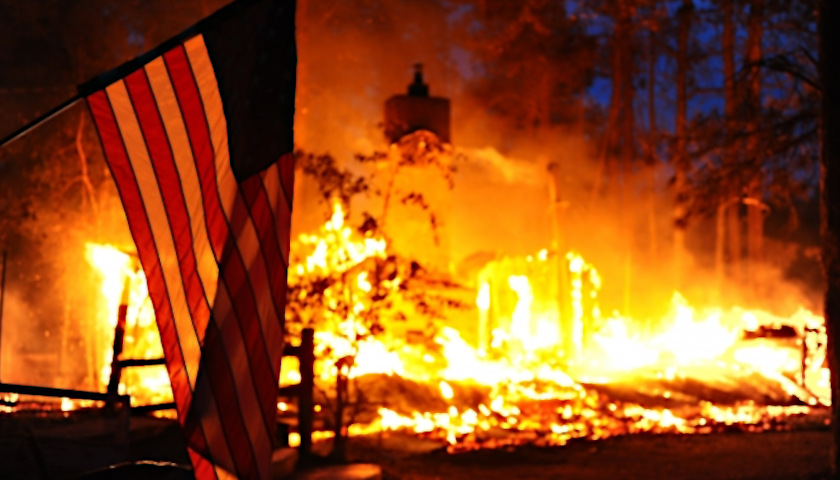by Roger Kimball
Denis Diderot, model of the French Enlightenment that he was, gave memorable expression to that movement’s inveterate anti-clericalism. “Man will never be free,” said the energetic Encyclopédiste, “until the last king is strangled with the entrails of the last priest.”
They don’t talk much about kings and priests, but the civilization-hating anarchists of the Black Lives Matter movement would applaud Diderot’s sentiments. Although they sometimes wrap their destructive actions in fine-sounding rhetoric about justice and anti-racism, what they are really about is hate.
Recapping Thursday’s madness, White House Press Secretary Kayleigh McEnany noted that “A federal agent’s hand was impaled by planted nails, another federal agent was shot with a pellet gun, leaving a wound deep to the bone, and tragically, three federal officers were likely left permanently blinded by the rioters using lasers pointed directly into their eyes.”
No wonder Brooks Brothers, Nike, Uber, and practically every other wretched business you have ever dealt with are falling all over themselves to proclaim their solidarity with Black Lives Matter and committing to end “systemic racism” in the United States.
How to explain the mind-boggling disjunction between the violent savagery of the BLM crusaders, on the one hand, and the nauseating spectacles of frightened though congratulatory self-abasement by the white elite, on the other? Are the latter pleased by the news emanating from Portland and similar enclaves of vicious woke sentimentality?
Please don’t talk to me about the violent career criminal George Floyd. As I have noted repeatedly, the violence engulfing various Democratic-controlled cities has nothing to do with Floyd’s demise. “The death of George Floyd in Minneapolis on May 25,” I wrote in early June “is merely the pretext for the violence. The cause is hatred.”
I hadn’t remembered it at the time, but Edmund Burke, reflecting on the burgeoning anti-clericalism of the French Revolution, makes a kindred distinction between permanent causes and transitory, shape-shifting pretexts.
History, Burke writes mid-way through Reflections on the Revolution in France, consists largely of “miseries brought upon the world by pride, ambition, avarice, revenge, lust, sedition, hypocrisy, ungoverned zeal, and all the train of disorderly appetites.” It is this unappeasable fountain of human nature that disrupts our social life with (here Burke quotes Spenser) “troublous storms that toss / The private state, and render life unsweet.”
Inveterate, all-too-human vices cause the storms, but we often miss the link because we are distracted by the lofty rhetoric with which such grubby vices swaddle themselves. “Religion, morals, laws, prerogatives, privileges, liberties, rights of men, are the pretexts” to which the “train of disorderly appetites” appeals to camouflage the base nature of its attacks.
It is not always easy to see through the masquerade, Burke notes, because “The pretexts are always found in some specious appearance of a real good.” Hence the sometimes vertiginous nature of this species of evil. Do you suppose, Burke asks, that you could “secure men from tyranny and sedition, by rooting out of the mind the principles to which these fraudulent pretexts apply?” Not likely, because those principles—freedom, justice, equality—are noble in themselves even if they are susceptible of perversion and malignant insinuation. Rooting them out, you would at the same time “root out every thing that is valuable in the human breast.”
As these are the pretexts, so the ordinary actors and instruments in great public evils are kings, priests, magistrates, senates, parliaments, national assemblies, judges, and captains. You would not cure the evil by resolving that there should be no more monarchs, nor ministers of state, nor of the gospel; no interpreters of law; no general officers; no public councils. You might change the names. The things in some shape must remain. A certain quantum of power must always exist in the community, in some hands, and under some appellation.
Burke’s point is that “Wise men will apply their remedies to vices, not to names; to the causes of evil which are permanent, not to the occasional organs by which they act, and the transitory modes in which they appear.”
We look at the streets of Portland and other cities, we listen to the Marxist rhetoric strained through the filter of racial redress, and we—some of us—feel that some great wrong is being expiated. In reality, the old wrong of that Hobbesian “perpetual and restless desire of power after power, that ceaseth only in death” is making its way in the world in a new disguise. But the fact of the disguise is hardly surprising. “Seldom,” Burke writes, “have two ages the same fashion in their pretexts and the same modes of mischief.”
Wickedness is a little more inventive. Whilst you are discussing fashion, the fashion is gone by. The very same vice assumes a new body. The spirit transmigrates; and, far from losing its principle of life by the change of its appearance, it is renovated in its new organs with the fresh vigour of a juvenile activity. It walks abroad; it continues its ravages, whilst you are gibbeting the carcass, or demolishing the tomb. You are terrifying yourself with ghosts and apparitions, whilst your house is the haunt of robbers. It is thus with all those, who, attending only to the shell and husk of history, think they are waging war with intolerance, pride, and cruelty, whilst, under colour of abhorring the ill principles of antiquated parties, they are authorizing and feeding the same odious vices in different factions, and perhaps in worse.
That is where we are now, in the midst of a howling “juvenile activity” that would destroy the United States, even as our guardians, long marinated in the liquor of bootless feelings of guilt, make themselves unwitting collaborators in their own destruction.
The bizarre process by which this proceeds is yet another feature of revolutionary fatuousness that Burke anticipated.
“They find themselves obliged,” Burke writes, “to rake into the histories of former ages (which they have ransacked with a malignant and profligate industry) for every instance of oppression and persecution which has been made by that body or in its favour, in order to justify, upon very iniquitous, because very illogical principles of retaliation, their own persecutions, and their own cruelties.”
History to the revolutionary spirit is but a gigantic warehouse of resentment and a toolbox of repudiation. Who is pure enough to survive such scrutiny? “It is not very just,” Burke writes, “to chastise men for the offences of their natural ancestors; but to take the fiction of ancestry in a corporate succession, as a ground for punishing men who have no relation to guilty acts, except in names and general descriptions, is a sort of refinement in injustice belonging to the philosophy of this enlightened age.”
You might think that thugs rampaging through the streets of our cities are imperfect representatives of any “enlightened age.” In fact, ignorant though they are, they are proud and legitimate progeny of that echt Enlightenment figure Karl Marx, whose abiding passion was hatred of the civilization that created him and whose legacy was tyranny, immiseration, and death—wrapped up, naturally, in sweet-sound bulletins about the brotherhood of man and the ultimate emancipation of human aspiration.
The messengers have changed their garb, but the hooligans smashing up courthouses and police stations as they pursue a course of indiscriminate carnage are fired by that same unholy “train of disorderly appetites” that Burke anatomized. We’ve been here, done that, and believe me, it does not end well.
– – –
Roger Kimball is editor and publisher of The New Criterion and the president and publisher of Encounter Books. He is the author and editor of many books, including The Fortunes of Permanence: Culture and Anarchy in an Age of Amnesia (St. Augustine’s Press), The Rape of the Masters (Encounter), Lives of the Mind: The Use and Abuse of Intelligence from Hegel to Wodehouse (Ivan R. Dee), and Art’s Prospect: The Challenge of Tradition in an Age of Celebrity (Ivan R. Dee).




